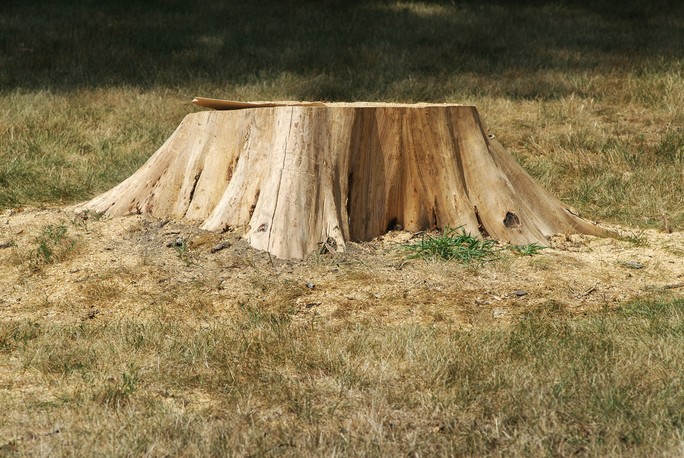Those Thorny, Deep-Rooted Sins
Written by Matt Caple
Working to remove the physical roots of old, dead trees led me to think about removing the spiritual roots of sins that we think are old and dead—but may not be as dead as we think.

Fourteen years ago I bought a tree shear. This shear is an impressive piece of equipment. It allows me to shear off a 20-foot tree at the ground. Then I can spray the stump with chemicals to kill the roots. It was always obvious if I missed spraying a stump, because a year later the roots would sprout a dozen new trees—especially if it was an unwanted tree like thorny locust.
As I worked diligently to remove the roots of thorny locust trees from the ground, my thoughts drifted to removing the roots of sin that were spiritually thorny problems.
The roots of sin
Leaving untreated tree roots in the ground is like removing the outward display of sin but leaving the inner motivations of those sins buried deep down inside. When the root of sin remains, these sins will sprout up again—usually in a time of weakness.
Like apples hanging from a tree, sin is dependent on its roots. An apple tree cannot produce pears, nor can an orange tree make avocados. Consequently, removing fruit will not change the identity of the tree. We remove the actions of sin as we repent, but we need to go further and root out the desire so the sin doesn’t sprout again.
In human terms, just changing behavior does not necessarily change the character of a person. Desire can remain alive and well under the surface, even when a person controls his or her behavior. Only by attacking the root of the problem (the desire and motive) can the sin be completely eliminated. If the root is left intact, sin will sprout again.
You never know what you will find
When I would use my shear to pull trees out by the roots, it would oftentimes expose unexpected discoveries. Once I pulled out a tree that had two copperhead snakes caught up in the roots. Thankfully, I had a windshield! I actually unearthed four copperheads that day, all of which I chased down with my tree shear.
The Israelites kept falling into sin even though they had seen God’s miracles, had been given God’s laws and had been blessed abundantly. God wished the Israelites had a right heart, a right root in them, to fear God and keep His Commandments.
Both evil fruit and righteous fruit first start with growth from the root, from the very heart of the plant. And just as the heart is very deceitful (Jeremiah 17:9), so it is with the roots of a plant.
Leave no roots behind
I pulled out a lot of trees, but sometimes the roots would break off. I’d have to come at them from a different angle and pull them out that way. Some roots were very deep in the soil and could be 7 or 8 feet long. Not all trees and roots are easy to remove, but I know from experience that if I leave part of the root in the ground, it will sprout and quickly grow back.
In the same way, we need to be careful about superficial repentance that fails to address the true depth and scope of the spiritual problem—that is, the deep and spreading roots of our sin.
The Pharisees were obsessed with the external evidence of righteousness. However, Jesus often pointed out to them that they missed the inward root of sin. One of those roots grew to the point that they murdered the Son of God.
We can’t be like them. We have to go deeper and recognize the bad motivations deep inside and strive to remove the roots of sin with tenacity and diligence. But that alone still isn’t enough, because we know that we can’t entirely remove sins by our own efforts. We need the help of God’s power, His Holy Spirit, to completely remove and kill the roots of sin so that we can become clean, ready for righteous fruits.
Pray for help
After his sin involving Bathsheba and Uriah, David knew that his sorrow and decision to change were just the beginning of repentance and change. He confessed his sin to God and asked for forgiveness. He acknowledged God’s superiority and righteousness as well as His true but merciful judgments. David asked God to remove the evil root of sin and create a clean heart (a pure, productive root) within him:
- “Behold, You desire truth in the inward parts, and in the hidden part You will make me to know wisdom” (Psalm 51:6).
- “Create in me a clean heart, O God” (verse 10).
After we recognize a sin that needs to be removed, we must enlist God’s powerful help to eliminate its roots.
Thankfully, we have God’s Word, which can help us to discover the root of sin and the results it produces. The author of Hebrews tells us that “the word of God … is a discerner of the thoughts and intents of the heart” (Hebrews 4:12). All the major root motivations of sin are identified in the Bible (1 John 2:16).
To find and destroy these roots, we must use all of our spiritual tools: prayer to God, study of His Word, introspective meditation and fasting. We must rely on God and follow His lead, working diligently as well to become like Him—down to the root.
To learn more of the principles for overcoming sin, read “Seven Steps for Overcoming Sin.”










